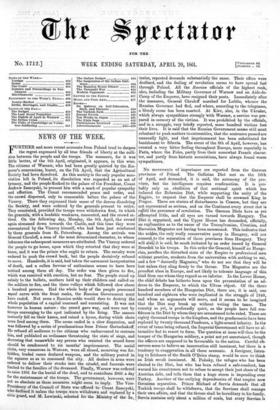NEWS OF TBF, WEEK.
FURTHER and more recent accounts from Poland tend to deepen the regret expressed by all true friends of liberty at the colli- sion between the people and the troops. The massacre, for it was little better, of the 8th April, originated, it appears, in this wise. The citizens of Warsaw, who had been greatly quieted by the Em- peror's' concessions, learnt, on the 7th April, that the Agricultural Society had been dissolved. As this society is the only popular asso- ciation left in Poland, its dissolution was regarded as an act of tyranny, and the people flocked to the palace of the President, Count Andrew Zamoyski, to present him with a mark of popular sympathy and affection. The Count recommended peace and order, and the crowd dispersed, only to reassemble before the palace of the Viceroy. There they expressed their sense of the decree dissolving the Society, and were ordered by the generals present to retire. They consented, provided the troops were withdrawn first, to which the generals, with a laudable weakness, consented, and the crowd re- tired. On the following day, Monday, the 8th April, the crowd again streamed down towards the Castle, and this time they were encountered by the Viceroy himself, who had been just reinforced by three generals from St. Petersburg. Among the arrivals was General Chruleff, a man of the most determined character, to whose influence the subsequent measures are attributed. The Viceroy ordered the people to go home, upon which they retorted that they were at home, and it was the prince who ought to return. The cavalry were ordered to push the crowd back, but the people decisively refused to move. Hundreds, it is said, had taken the sacrament inexpectation of death, and a sullen fervour of enthusiasm seems to have been noticed among them all day. The order was then given to fire, which was received with emotion, but no fear. The people stood up calmly to the bullets, mothers held np their children and called on the soldiers to fire, and the three volleys which followed slew about a hundred persons. Had the whole body of the people possessed equal nerve with the front ranks, the Russian Government mitt have ended. Not even a Russian noble would dare to destroy the whole population of a capital unarmed and unresisting. It was not however in human nature : the crowd gave way, and were met by troops converging to the spot indicated by the firing. The masses instantly fell on their knees, and raised a hymn, during which shots were fired among them. The scene ended in a slow dispersion, and was followed by a series of proclamations from Prince Gortschakoff. He refused all audience to the citizens who endeavoured to restrain him, and published an ordinance threatening the state of siege, and decreeing that meanwhile any person who resisted the armed force should be condemned to six months' imprisonment. The social clubs, very numerous in Warsaw, were all closed, mourning was for- bidden, loaded canes declared weapons, and the military posted in the squares so as to command the city. All dealers in arms were ordered to deliver their stocks into the citadel, and funerals were limited to the families of the deceased. Finally, Warsaw was ordered to raise 1501. for the burial of the dead, and to contribute 2001. a day for the maintenance of the troops. The government, however, were not so absolute as these measures might seem to imply. The Vice- Presidency of the Council of State was offered to Count Zamoyski,
moys who declined it unless the troops were withdrawn and replaced by a civic guard, and M. Lewinski, selected for the Ministry of the In_
terior, repeated demands substantially the same. Their offers were declined, and the feeling of revolution seems to have spread fast through Poland. All the .Russiax officials of the highest rank, also, including the Military Governor of Warsaw and an Aide-de- Camp of the Emperor, have resigned their posts. Immediately after the massacre, General Chruleff marched for Lublin, whence the Russian Governor had fled, and where, according to the telegrams, a bloody scene has been enacted. At Kiev, also, in the Ukraine, which always sympathizes strongly with Wariaw, a service was pre- pared in memory of the victims. It was prohibited by the officials, and in a struggle, very briefly reported, some hundred victims lost their lives. It is said that the Russian Government seems still most reluctant to push matters to extremities, that the sentences passed are unusually light, and that imprisonment has been substituted for banishment to Siberia. The event of the 8th of April, however, has created a very bitter feeling throughout Europe, more especially in • Paris, where the Poles, partly from their somewhat French charac- ter, and partly from historic associations, have always found warm sympathizers.






























